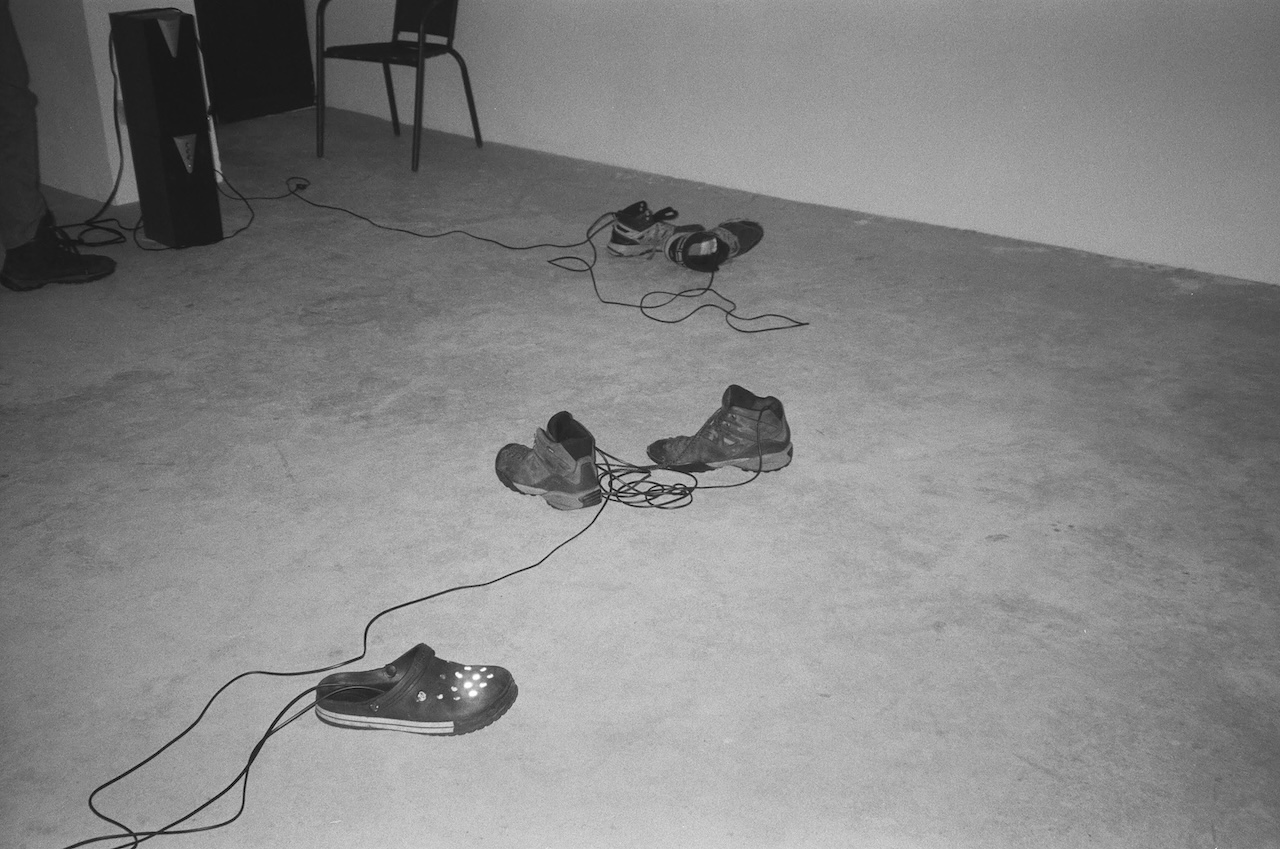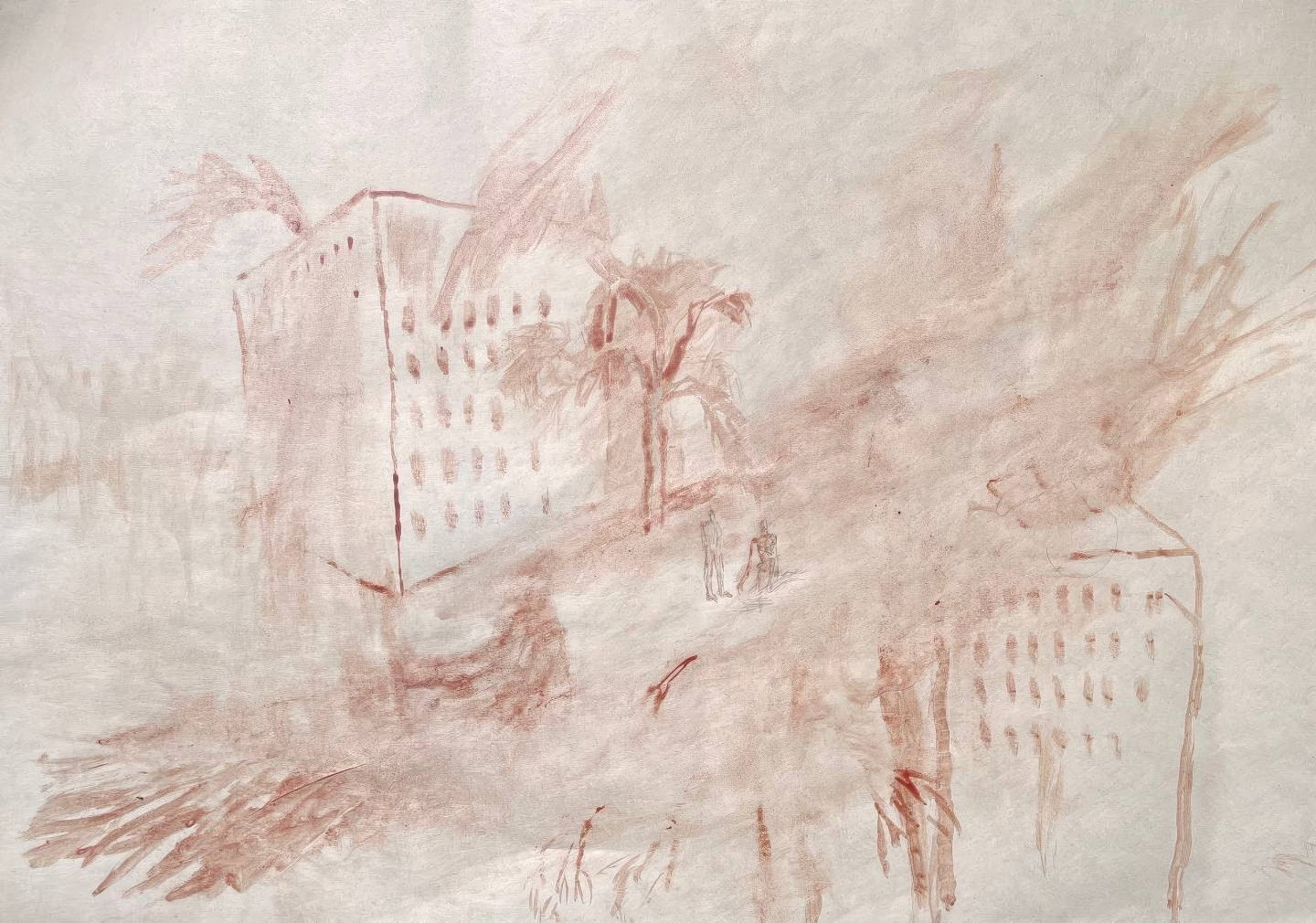
Graffiti featuring Daniil Kharms, Kharkiv, Ukraine, 2008.
After February 24, 2022, when the Russian army attacked Ukraine, the sinister image of Russia in the discourse of the Ukrainian mass media took the form of an “Absolute Evil” (Russia is “Mordor” and Russians are “orcs”). Any manifestations of this evil were regarded as toxic and disastrous for Ukraine and the entire civilized world. In this situation, Russian culture and the Russian language—which, after the adoption in 2019 of the law “On Supporting the Functioning of the Ukrainian Language as the State Language” (the so-called “movnyi law”), were already effectively banned in the public sphere in Ukraine—are considered as subject to final exclusion and eradication, which is what Ukrainian cultural and educational institutions are doing now (the Language Ombudsman, special commissions of the Ministry of Education, etc.).
Against this backdrop, we read the recent statement from a Ukrainian government spokesperson that Russian culture in Ukraine, on the contrary, should be preserved and used because it can help, firstly, to defeat Russia in the war, and secondly, to make Ukraine the center of European culture based on cultural diversity. This opinion was expressed by Aleksey Arestovich, adviser to the head of the President’s Office, who stated in an interview that “the strategy of isolation from Russia will not help to win. Only the strategy of creating an alternative center of gravity for all those in Russia and Belarus reaching for the light will help. So that everything that is reasonable in Russia will end up here. Otherwise, they will become a resource for Europe.”1
Many leading Ukrainian cultural figures and writers categorically disagree with this point of view, arguing that since all Russian culture is imperial and colonial, there is nothing useful for Ukrainian culture in it, and that Russian culture—in particular Russian literature— deserves total cancellation, as it carries only negative, “concentration camp” experience.
The critical message of Ukrainian writers regarding Russian literature was supported by some opposition Russian intellectuals, who have claimed that so-called “great Russian literature” has always been militaristic, and that the modern Russian liberal intelligentsia has for many years served as a cover for the repressive and militaristic Putin regime.2 Therefore, monuments to Russian writers in Ukraine must be destroyed, just as Black Lives Matter protesters destroyed monuments to white colonialists and slave owners. In Slavic studies programs at modern Western universities, Ukrainian writers should be studied instead of Russian ones.
So what should Ukrainians do with Russian culture and Russian literature amidst the war with Russia? Should they completely abandon it as hostile to Ukrainian culture and exclude from the sphere of education everything connected with it, including works from Nikolai Gogol’s St. Petersburg period, as Ukraine’s Ministry of Education suggests? Or, on the contrary, should Ukrainians appropriate it in order to try to use it as a subversive weapon against Russian aggression?
As for so-called “great” Russian literature, its tradition of literary “generals” and its cult of individuality and victoriousness is certainly at odds with the decolonial aspirations of the Ukrainian people and other peoples of the former Russian Empire.
But in Russian culture, as in any imperial culture, besides the “great” culture of the “winners” there is also a culture that is not triumphalist, not “great”; in other words, there is a minor culture, in the Deleuzian sense. Minor culture is, according to Deleuze, a culture of emancipatory desire that is directed against the desire for domination and power cultivated by the prevailing culture. The credo of minor culture is to reject any “master literature,” which, according to Deleuze and Guattari, has “only one single dream: to assume a major function in language, to offer [itself] as a sort of state language, an official language.”3 Minor culture cherishes the opposite dream: it strives to become minor, to slip away into pop writing, pop philosophy. Its purpose is “to make use of the polylingualism of one’s own language, to make a minor or intensive use of it, to oppose the oppressed quality of this language to its oppressive quality, to find points of nonculture or underdevelopment, linguistic Third World zones by which a language can escape, an animal enters into things, an assemblage comes into play.”4
By defining counter-powerful, counter-colonial strategies through the concept of smallness or minority, Deleuze and Guattari do not mean to imply that such strategies are weak, helpless, or exclusively peaceful and nonviolent. Rather, minority culture and philosophy function, according to Deleuze and Guattari, as an intellectual war machine whose fighting technique is comedy, aimed at undermining the seriousness and pretension to significance of big culture, allowing one to see the stupidity and vulgarity of its desire for domination.
Minor culture/literature in the context of Russian culture is not Alexander Pushkin, founder of the Russian literary language, but Andrei Platonov, “the Russian Kafka,”5 according to leading contemporary Russian philosopher Valery Podoroga; not Fyodor Dostoevsky and not even Leo Tolstoy, but “delirious genius” and “man-absurd” Daniil Kharms and his literary group Oberiu (Union of Real Art); not international star Alexander Solzhenitsyn, but instead the lesser-known Varlam Shalamov, author of Kolyma Tales, “the definitive chronicle” of life in the labor camps. Moreover, choosing minor literature over major literature often means choosing little-known women authors—not Anna Akhmatova or Marina Tsvetaeva, the only two recognized great Russian poetesses, but women writers whose names are not familiar to a wide readership and who are often derided as graphomaniacs or epigones. In Russian literature of the Silver Age (late nineteenth to early twentieth century), there were many such female figures, like Nina Petrovskaya, Irina Odoevtseva, and Nina Berberova. Writing by these kinds of women authors, which has been celebrated by feminist literary criticism, offers strategies for escaping the masculine logic of domination and triumphalism, and deconstructs traditional cultural hierarchies.
Amidst the ongoing Russian aggression in Ukraine, there are heated debates among political theorists about how to define Putin’s power—is it fascism or not? Supporters of both views often agree, however, that in Russia, unlike the fascist states of the past, there is no mass mobilization, since Putin, who hates the people and does not trust any spontaneous collective action, is afraid to unleash the energy of the masses. (The regime even covers up the war and threatens fifteen years in prison for those who call the “special military operation” a war). According to Russian sociologist Grigory Yudin, instead of grassroots mobilization for fascism in Russia, the state was seized by the Putin clan.6 Therefore, in order to defeat modern fascism in Russia, it is necessary, first of all, to destroy Putin’s state, on the ruins of which Russian culture and language can build a new, anti-fascist future.
I disagree with the notion that the Putin regime has not used mass mobilization. It is obvious that the regime has carried out mass fascist mobilization if we understand fascism, as Judith Butler does, as a regime in which social ties and the human desire for intimacy are used to destroy basic cultural values, primarily the values of human life.7 In order to defeat Russian fascism, it is necessary not only to destroy Putin’s state or remove Putin and his cronies from power, but to carry out anti-fascist demobilization. In Butler’s sense, we must carry out a reorientation of social ties from the values of individualism to the universal values of life—the recognition of the equal value of all human lives as a principle of radical equality. The principle of radical equality proclaims the value of not only select heroic lives (around which major culture and literature is oriented), but the value of non-heroic lives—subjects of minor culture and literature.
I believe that an effective resource for anti-fascist demobilization is minor literature. The reader of Pushkin, Dostoevsky, and even Tolstoy can easily be mobilized to participate in war—to take up arms and kill. It is much more difficult to mobilize, to send to kill civilians, the readers of Platonov, Kharms, Shalamov, and minor women’s literature. To implement demobilization strategies in Russia, Ukrainians (and their allies in Russia) need to rely on minor Russian literature and minor Russian culture in general. Without this, anti-fascist mobilization cannot be carried out and the desire of the masses will always be the desire for fascism, the desire for war as the desire for their own repression, which Wilhelm Reich wrote about.
In order to defeat fascism, Ukraine should not strive to become a Great Culture, the center of European culture, because Great Culture is an imperial project that always retains the germs of fascism. The truly emancipatory strategy is the decolonial strategy of becoming minor, eluding the fantasy of colonial greatness.
“Арестович считает, что Украина проиграет войну, если откажется от культурного разнообразия,” (Arestovich Believes That Ukraine Will Lose the War If It Renounces Cultural Diversity), Страна (Strana), June 6, 2022 →.
See, for example, Mikhail Mayatsky’s lecture at the roundtable “Sciences of Theory and Sciences of Action,” XXVIII NLO Bath House Readings, April 2022 →.
Gilles Deleuze and Félix Guattari, Kafka: Toward a Minor Literature, trans. Dana Polan (University of Minnesota Press, 1986), 27.
Deleuze and Guattari, Kafka, 26–27.
Deleuze and Guattari read Franz Kafka as an outstanding representative of minor literature.
Grigory Yudin, “Настоящий фашизм” (Real Fascism), RE:RUSSIA, June 2, 2022 →.
Judith Butler, The Force of Nonviolence: The Ethical in the Political (Verso, 2020).









